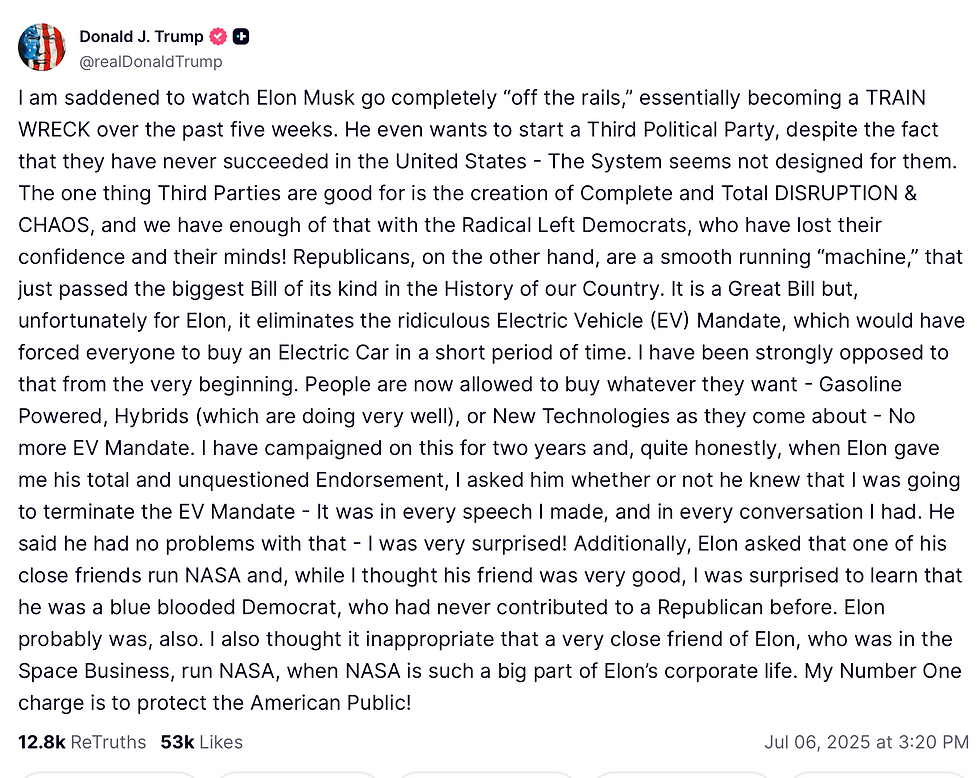Musk’s Ego Trip Goes Political Again: The "America Party" Looks Like A Fraud Wrapped In A Cult
- Howie Klein

- Jul 7, 2025
- 7 min read
White Party Rising— The Rich Rocket Man’s Revolution

Of course the grifters who run No Labels were among the first to jump into bed with Musk’s money/new party. Naturally, most of No Label’s congressional supporters are Republicans, but the Democrats who No Labels grifter-in-chief Nancy Jacobson emphasizes as among their top allies in this introductory video are the worst of the worst: Josh Gottheimer (Blue Dog-NJ), Jared Golden (Blue Dog-ME), Marie Gluesenkamp Perez (Blue Dog-WA), Ritchie Torres (New Dem-NY), Vicente Gonzalez (Blue Dog-TX), Don Davis (Blue Dog-NC), Ed Case (New Dem-HI), Jimmy Panetta (New Dem-CA), and Susie Lee (New Dem-NV).
But the Member of Congress who I talked with yesterday about the America Party, which Musk claims— falsely as far as I can tell— that he’s officially registered, is a true blue progressive Democrat who detests No Labels and, more or less, everyone connected with it. He also seems pretty fed up with the Democratic Party— or at least the congressional version thereof— and has nothing but contempt for Schumer and Jeffries. He appeared a lot more enthusiastic about “the America Party” than anyone else I’ve talked to… enthusiastic and optimistic and of the opinion that it could be successful. Put aside for a moment that it’s already being called “the White Party,” there are myriad problems it faces if Musk is serious about getting it off the ground. Yesterday’s Washington Post published a piece by Maegan Vazquez about 6 of them.

The wealthy— and very subsidized— South African Neo-Nazi, who gained American naturalization under pretty dubious circumstances and who Trump is talking about deporting, is dependent on the U.S. government for the prosperity of several of his companies, especially SpaceX. But it appears, at least for the moment, that he’s “done with supporting Trump and most Republicans in Congress... But Musk’s party faces major challenges, ranging from a political structure that favors the two-party system to his personal temperament. Here’s a look at some of the biggest obstacles.” And this list doesn’t even count the potential impact on his companies. It’s like this guy can’t learn any lessons.
1- Institutional barriers and ballot rules
The United States’ winner-take-all electoral system is not welcoming to third parties.
Hans Noel, a professor who teaches political history and political methodology at Georgetown University, said the United States does not have “institutions that are open to multi, third parties being super successful.”
“You have to win outright in order to get anything,” Noel said. “So it’s not like in other democracies where you start a small party and you get, you know, 20 or 30 percent of the vote, and then you get some share of the seats in the legislature and you can build from that.”
Beyond the winner-take-all system, if Musk wants to buoy federal candidates in different states or, eventually, establish a third-party presidential candidate, his new organization will have to comply with the varying requirements for getting on ballots.
States and the Federal Election Commission have rules and requirements for registering a new political party. States also have their own rules, often including residential requirements and petition signatures from voters.
Mac McCorkle, a professor at the Sanford School of Public Policy at Duke University, said the ballot criteria could pose a “daunting” problem.
“To get on the ballot, there’s going to be a lot of petition signature requirements,” said McCorkle, who previously worked as a Democratic consultant. “On the other hand, he probably has enough money to be able to do that.
These requirements have tripped up many third-party candidates. During the 2024 presidential election, no notable third-party candidates, including the Libertarian Party’s Chase Oliver, the Green Party’s Jill Stein, Cornel West and Robert F. Kennedy Jr., appeared on ballots in all 50 states.
2- Historical headwinds and recent challenges
Political parties outside the American two-party system have long existed, but their recent national appeal has been limited.
The last time a presidential candidate who was not a Republican or Democrat won electoral votes was 1968, when five [racist] Southern states went for American Independent Party [racist] nominee George Wallace.
Billionaire tycoon Ross Perot received about 19 percent of the popular vote in 1992 and no electoral college votes. “Perot did amazingly well… but he didn’t come in first in any state, and the way the electoral college works, that means he’s got nothing,” Noel said.
Ralph Nader’s 2000 run for president under the Green Party, experts have argued, contributed to such a close outcome in Florida that Republican George W. Bush won the election only after the Supreme Court weighed in. Still, Nader obtained zero electoral votes.
Independent Sens. Bernie Sanders (Vermont) and Angus King (Maine), caucus with Democrats. Two former senators who left the Democratic Party and became independents while still in office, Kyrsten Sinema of Arizona and Joe Manchin of West Virginia, did not run for reelection in 2024. Justin Amash represented Michigan in the House of Representatives, starting as a Republican but leaving the party in 2019 and becoming a Libertarian in 2020. After considering a Libertarian presidential run, he decided not to seek reelection to his House seat.
3- Scope and strategy
Musk wrote Saturday on Twitter that he plans to target the midterm elections next year. He likened his strategy to the tactics of Greek general Epaminondas against the Spartans: “Extremely concentrated force at a precise location on the battlefield.”
Musk previously mused about the potential to influence the makeup of Congress by focusing on a small number of key Senate and House races, but he has not named specific targets.
“Given the razor-thin legislative margins, that would be enough to serve as the deciding vote on contentious laws, ensuring that they serve the true will of the people,” Musk wrote on Twitter on Friday.
Although McCorkle believes Musk’s candidates won’t win, the Duke professor said they can act as “spoilers and confusers” undermining Republicans running for office and capturing just enough votes to make a difference in battleground states like North Carolina. Musk’s nominees <> could affect midterm elections<>, when there’s “probably going to be a drop-off of MAGA voters,” McCorkle said.
…
4- Divisions among his potential audience
On Saturday, Musk appeared to agree with a Twitter user who laid out a party platform that calls for reducing the national debt, modernizing the military with artificial intelligence and robotics, supporting deregulation and free speech, backing “pro tech” and pro-natalist stances, and supporting “centrist policies everywhere else.”
However, the 80 percent of “the middle” that Musk says he is after, Georgetown’s Noel argued, does not necessarily have enough cohesion to form a political party.
“People have attachments to the existing parties, and they’re frustrated with them, and they don’t like them. People have concerns, but there’s no sort of constituency that he’s got,” Noel said. “What is he going after?… That 80 percent is not well defined at all.”
5- Garnering political allies
In the wake of his exit from the federal government and his subsequent blowup with Trump and congressional Republicans, Musk’s influence with the party appears to be waning. Trump ally James Fishback has already said that he’s establishing a super PAC to blunt Musk’s political efforts.
While Musk’s wealth has served his political efforts, strong political parties can raise money from networks of interested voters, Noel said.
“Your ability to raise it means you know how to have a connection with a whole bunch of people who will not only give you money but may also do something for you— or at least vote for you,” Noel said.
A new party, Noel said, will need unusually dedicated voters with the energy to campaign in elections, even after early losses. “You can’t just buy that,” he said.
There is at least one spending-averse, libertarian-minded Republican in Congress whom Musk continues to support: Rep. Thomas Massie (R-KY). Two non-Republican groups, the Libertarian National Committee and the centrist political group No Labels, say they want to work with Musk.
6- Patience
Will a temperamental billionaire widely known for defying norms and setting ambitious targets for his teams, engineering rocket ships and designing electric cars tolerate the myriad processes to get candidates on ballots only to potentially lose their races? Noel and McCorkle said he may have to acclimate to party losses before he sees political success.
“I’m not sure he has the patience,” McCorkle said. “How he’s going to vet candidates? There’s going to be a lot of wannabes who think, ‘Hey, Elon Musk is going to fund me. What the heck?’ … So it could turn out to be an embarrassment for Musk, too, if he’s trying to put a lot of people on the ballot.”
Musk observed the limitations of money in politics firsthand earlier this year, when his groups invested more than $20 million to back a conservative Wisconsin Supreme Court race.
The contest cost more than $100 million, making it the most expensive judicial race in U.S. history. Despite Musk’s spending and hyperbolic framing of the race, which he argued could chart the course of Western civilization because of what it could mean for Trump’s agenda, liberal candidate Susan Crawford ultimately won.
Musk has also gone back-and-forth in recent months about how much he planned to spend toward political causes.
After his candidate lost the Wisconsin race, Musk had said he planned “a lot less” political spending going forward, but left the possibility open to reenter if he saw “a reason to do political spending in the future.”
McCorkle said he could not believe Musk would spend “the rest of his life trying to create a new party.”
“I think this is all about his feud with Trump and trying to sink the Trump legacy right now,” he added.
I for one don’t believe this is the launch of a real political party. It’s Musk play-acting as George Washington while actually behaving like a bored Habsburg princeling trying to start a silly version of an insurrection. The “America Party” isn’t populist, isn’t centrist, isn’t even coherent— it’s just the latest fever dream of a plutocrat who thinks democracy— which he and his Silicon Valley cronies hate— should be an app on his phone. He’s not building a movement; he’s staging a vanity stunt with unlimited money and zero discipline. It’s another cult of personality, this time with a ketamine personality.

When the smoke clears, this “party” is likely to function the way all billionaire experiments in democracy do: as a wrecking ball aimed straight at what little remains of civic cohesion. Like Perot or Wallace, Musk’s party exists to bleed votes from both sides, confuse the public, launder his reputation and maybe, just maybe, install an even more authoritarian regime in the chaos. This isn’t a new center— it’s a libertarian fever dream wearing the skin of populism, designed to keep the wealth hoarded and the MAGA rabble confused. If history tells us anything, it’s that when the ultra-rich start forming “movements,” the rest of us better get ready to fight.








Comments